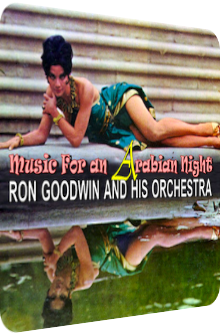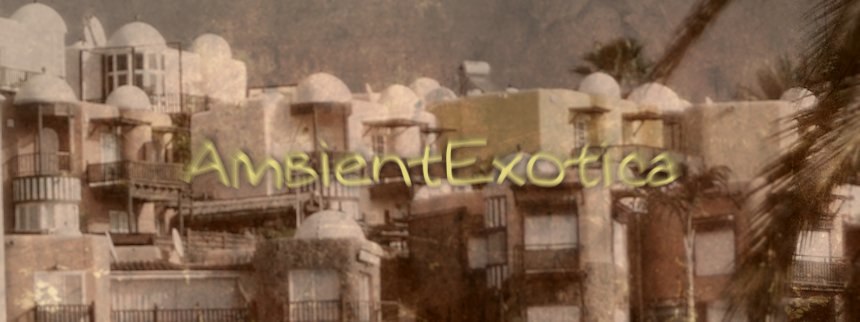
Ron Goodwin
Music For An
Arabian Night
1959
Shortly before becoming a world-famous film composer of such iconic themes as Miss Marple (1961) or Operation Crossbow (1964), British musician Ron Goodwin (1925–2003) arranged and conducted various songs for Petula Clark and Peter Sellers and released a few string-laden LP's with a focus on cinematic compositions and the aural depiction of foreign countries.
Music For An Arabian Night is such a release, and while the title suggests an album full of mystical Middle Eastern melodies, the year of its release, Goodwin's nationality as well as the nature of the Exotica genre should give the attentive collector more than enough clues what to expect, or rather: what not to expect. First of all, there are no vocal tracks, not even female singing, even though these elements allow for a particularly Oriental flavor without the use of exotic instruments. Secondly, while speaking of exotic instruments, Goodwin uses the established trick of presenting foreign melodies and presumed habitual festivities with the help of primarily Western instruments.
Similar to Les Baxter's compositions, Goodwin uses a string ensemble that adds romantic notions and colorful vibes to the music. Another curious addition – from an Arabian viewpoint, at least – is the heavy integration of the accordion, an instrument that has next to nothing to do with a truthful rendition of an Arabian night. And this remains the case in terms of all songs. The title Arabian Night itself is thus an insult, for there is no such thing as a typical night in an Arab country … with an accordion in both hands. However, before I am spoiling all the fun, I'll better take a closer look at this album with its 12 unique compositions. But let me tell you in advance: things aren't looking particularly good, I'm afraid.
Windows Of The East is a strong opener with typical Oriental tone sequences played on violins, an alto flute and glaring string washes that add cinematic qualities to the setup that is completed with gentle tambourines and bongos as well as the aforementioned accordion. While this song is probably a bit too joyful and quick, it wouldn't be entirely out of place in Lawrence Of Arabia – which it precedes for 3 years! Bazaar is a playful song with heavy accordion backings, vibrantly polyphonous flutes and a prominent inclusion of a zither. Expect anything but a bazaar atmosphere, though. The setting is more similar to a galloping coach ride – through Paris! This is a nice little ditty that already shows the album's problems in regard to an overarching coherence.
The following Old Beirut, however, can be considered a mild affront: the bongo beat is very placid and the strings are vivid as usual, but the flute sections as well as the accordion bits which are accompanied by piano droplets are so out of place and saccharine that I wonder if some prankster changed the LP while I didn't pay attention. This could be an ode to Rome or a dedication to Salamanca, but Beirut is the last place I would link to this song, which at the end of day is freed from any Oriental cliché. Wedding Dance is more akin to a gypsy ceremony due to the reliance on zithers and accordions. However, the melody is catchy, and the added bongo groove in the middle section are enjoyable to me.
Return To Paradise is next, and it's an upbeat composition with pompous, darker strings, tremoling flutes and gentle maracas. It is way to sweet to my liking, but I have to admit that the intermixture between quiet passages and string-filled counterparts is working quite well, for every instrument is allowed to shine. It's less about the interplay and more about the presentation of individual sound characteristics. Arab Feast provides a much needed dosis of actual Arabian clichés of the Western kind, for the exotic percussion and the distinctive flute melody truly do evoke an interesting soundscape. Once the accordion and the glitzy brass sections enter, that Arabic feeling wanes, and as if to widen the contrast even more, there's the short section of a quavering paradisiac flute.
Side B can only get better and more focused on the promised topic. And indeed, Dancing Eyes offers a quickly-paced and percussion-heavy Arabian ditty with according flute melodies. The Hollywood strings aren't a huge turn-off, for the Arabian flute and the glitzy strings display the synergies of Exotica perfectly, to my mind at least. Another huge track is Barefoot Girl, and once more, the Arabian setting is perceptible and utterly welcome. The cheeky rhythm plus the mix of zither and accordion do work indeed and are quite a change to the previous songs. While similar in parts to Greek Folk music, Barefoot Girl is the second song that I fully agree with. The omission of the strings is a wise choice, and their lack provides a greater intimacy and liveliness. Thumbs up!
Another winner follows next: the gorgeous The Moon And I which oscillates permanently between sparkling, dreamy xylophone scintillas together with Arabian flute melodies on the one hand and the appropriate counter-reaction with slightly melancholic, but very vivid and voluminous string sections on the other. Goodwin surely turns things around on side B! The penultimate song offers an Arabian setting as well: Desert Hero offers an exciting tick-tock rhythm plus a pestering accordion, but to my surprise offers a sitar-like string instrument as well. Whatever it is, its inclusion is added far too late, but the Arabian flavor is huge. The final Cedars Of Lebanon offers an exciting xylophone-string mixture that is highly melancholic, majestic and cinematic, but its Arabian flavor is thin (and has nothing to do with the U2 song of he same name, for what it‘s worth). The strings, however, have that certain Lawrence feeling. A great last song to a lackluster album with an unexpectedly effective side B.
Does it matter how an album and its tracks are called as long as the music is good? This issue isn't picayune! Yes indeed, we‘re talking about an Exotica record here rather than about a Thomas Pynchon novel. But I feel the urge to stress how important an overarching concept is, regardless of the medium or the genre. Goodwin was a skilled conductor and song writer, no doubt about that. But the expectations of the listener aren't met, let alone fulfilled with this album. Apart from second-long Arabian setups, for instance the gorgeously cinematic Windows Of The East, the liveliness of Barefoot Girl and the dreamy atmosphere of The Moon And I, there is simply no Arabian feeling evoked in the process of listening.
No sitar, no gourd, no shawm or Oriental clave is included, and while the mimicry of Arabian tone sequences on an accordion is outright positively funny, this trick must not be used incessantly. This is all the more audacious due to the colorful promises the liner notes suggest: "Maybe you don't know any harem girls, but your girl friend might like to try a scarf dance to some Arabic rhythms and lush Oriental melodies while you sip Turkish coffee." Sure she might like to try, I mean who wouldn't, but if you play this record to her, the engagement is likely to be over. While I am often rolling my eyes due to cliché-laden compositions, Music For An Arabian Night is on the opposite side of the spectrum: there cannot be any cliché attached, for there are hardly any Arabian pieces on the album. I've counted 4 compositions – depending on the greatness of your heart, your mileage may vary, but not by much – and that's not enough.
I'm sorry to say, but this album was supposedly created for cashing in big time … maybe the compositions were already finished and the Arabian theme was added as an afterthought? Whatever may be the case, this one is a letdown. Exotica fans probably want to own this, but do they also listen to it? I doubt it, because after the very strong first tune, it goes downhill on side A and only gets quite a bit better on side B. If this album was titled differently, say, Adventures In Rome or something like that, I would've bought it, both the album and its overarching concept. But in this incarnation, the discongruence between album artwork, track titles and compositions is way too huge. Side B is way better, but its qualities aren't enchanting enough to forgive the various missteps that happened beforehand.
Exotica Review 055: Ron Goodwin – Music For An Arabian Night (1959). Originally published on Apr. 7, 2012 at AmbientExotica.com.
